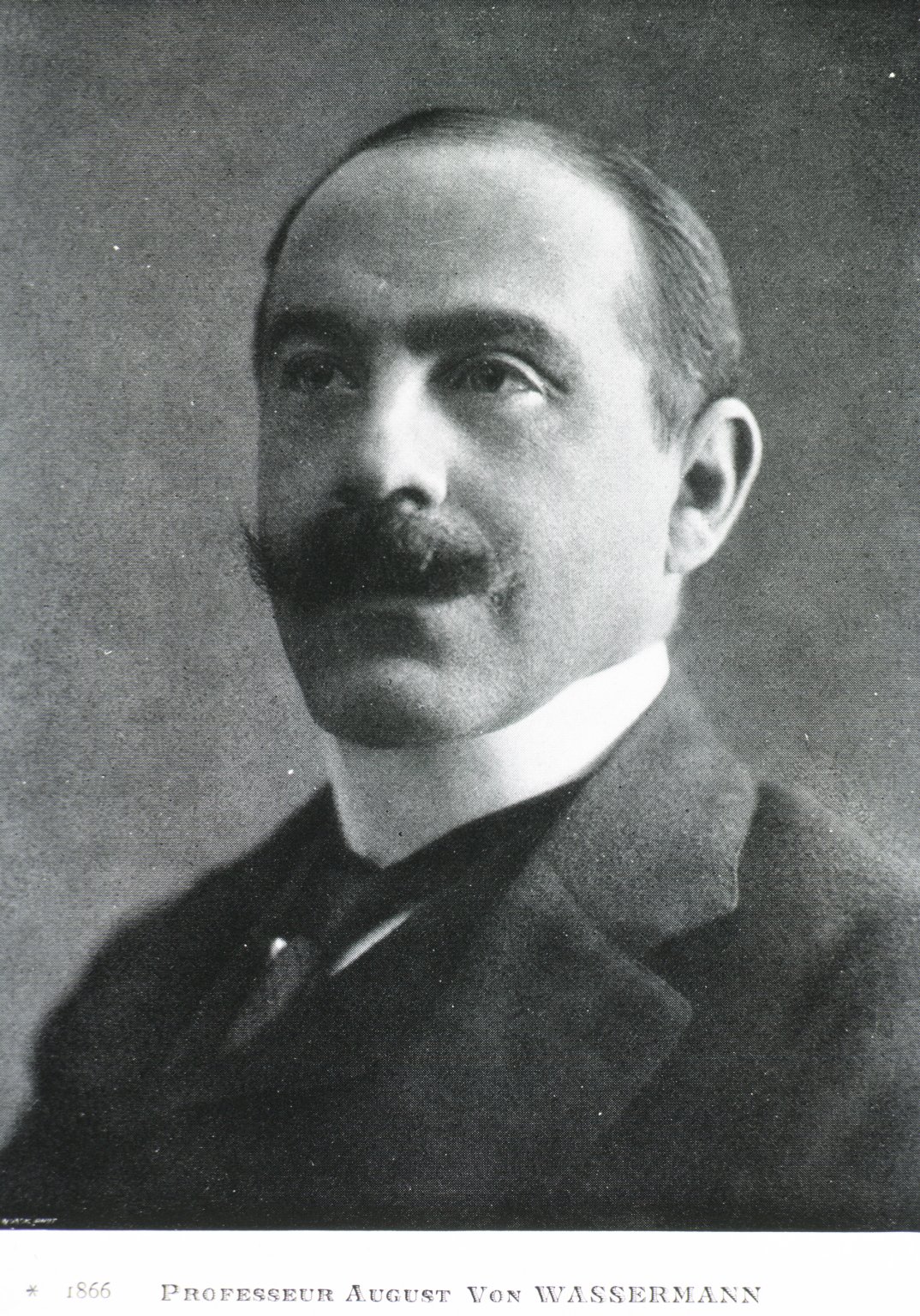August von Wassermann
 August Wassermann|thumb]] August Paul von Wassermann (21 February 1866 – 16 March 1925) was a German bacteriologist who is best known for developing the Wassermann test, a diagnostic test for syphilis. He was a key figure in the early days of immunology and made significant contributions to the study of various infectious diseases.
August Wassermann|thumb]] August Paul von Wassermann (21 February 1866 – 16 March 1925) was a German bacteriologist who is best known for developing the Wassermann test, a diagnostic test for syphilis. He was a key figure in the early days of immunology and made significant contributions to the study of various infectious diseases.
Early Life and Education[edit | edit source]
August von Wassermann was born in Bamberg, Germany, into a Jewish family. He pursued his medical education at several German universities, including the University of Erlangen, the University of Vienna, and the University of Strasbourg. After completing his studies, Wassermann began his career in medical research, focusing on bacteriology and immunology.
Career and Contributions[edit | edit source]
In 1906, Wassermann, in collaboration with Albert Neisser and Carl Bruck, developed the Wassermann test, which was the first blood test for the diagnosis of syphilis. This test represented a significant breakthrough in medical diagnostics and was based on the principles of complement fixation, a concept in immunology that Wassermann was instrumental in developing.
Wassermann's work extended beyond syphilis. He was involved in research on tuberculosis, diphtheria, and tetanus, contributing to the understanding and development of vaccines and therapeutic sera for these diseases. His research in immunology laid the groundwork for future discoveries and treatments in infectious diseases.
Throughout his career, Wassermann held several prestigious positions, including the director of the Institute of Infectious Diseases in Berlin. He was also a member of the German Academy of Sciences Leopoldina, one of the oldest science academies in the world.
Legacy[edit | edit source]
August von Wassermann's contributions to bacteriology and immunology have had a lasting impact on the field of medicine. The Wassermann test, despite being superseded by more modern techniques, was a cornerstone in the diagnosis and understanding of syphilis and other diseases. Wassermann's work in immunology continues to influence the study and treatment of infectious diseases today.
Wassermann's dedication to science and medicine was recognized with numerous awards and honors during his lifetime. His legacy is remembered for the significant strides he made in improving public health through his research in bacteriology and immunology.
Death[edit | edit source]
August von Wassermann died on 16 March 1925 in Berlin, Germany. His death marked the loss of one of the most prominent figures in the field of medical research of his time.
Transform your life with W8MD's budget GLP1 injections from $125 and up biweekly
W8MD offers a medical weight loss program NYC and a clinic to lose weight in Philadelphia. Our W8MD's physician supervised medical weight loss centers in NYC provides expert medical guidance, and offers telemedicine options for convenience.
Why choose W8MD?
- Comprehensive care with FDA-approved weight loss medications including:
- loss injections in NYC both generic and brand names:
- weight loss medications including Phentermine, Qsymia, Contrave, Diethylpropion etc.
- Accept most insurances for visits or discounted self pay cost.
- Generic weight loss injections starting from just $125.00 for the starting dose
- In person weight loss NYC and telemedicine medical weight loss options in New York city available
Book Your Appointment
Start your NYC weight loss journey today at our NYC medical weight loss, and Philadelphia and visit Philadelphia medical weight loss Call (718)946-5500 for NY and 215 676 2334 for PA
Search WikiMD
Ad.Tired of being Overweight? Try W8MD's NYC physician weight loss.
Semaglutide (Ozempic / Wegovy and Tirzepatide (Mounjaro / Zepbound) available. Call 718 946 5500.
Advertise on WikiMD
|
WikiMD's Wellness Encyclopedia |
| Let Food Be Thy Medicine Medicine Thy Food - Hippocrates |
Translate this page: - East Asian
中文,
日本,
한국어,
South Asian
हिन्दी,
தமிழ்,
తెలుగు,
Urdu,
ಕನ್ನಡ,
Southeast Asian
Indonesian,
Vietnamese,
Thai,
မြန်မာဘာသာ,
বাংলা
European
español,
Deutsch,
français,
Greek,
português do Brasil,
polski,
română,
русский,
Nederlands,
norsk,
svenska,
suomi,
Italian
Middle Eastern & African
عربى,
Turkish,
Persian,
Hebrew,
Afrikaans,
isiZulu,
Kiswahili,
Other
Bulgarian,
Hungarian,
Czech,
Swedish,
മലയാളം,
मराठी,
ਪੰਜਾਬੀ,
ગુજરાતી,
Portuguese,
Ukrainian
Medical Disclaimer: WikiMD is not a substitute for professional medical advice. The information on WikiMD is provided as an information resource only, may be incorrect, outdated or misleading, and is not to be used or relied on for any diagnostic or treatment purposes. Please consult your health care provider before making any healthcare decisions or for guidance about a specific medical condition. WikiMD expressly disclaims responsibility, and shall have no liability, for any damages, loss, injury, or liability whatsoever suffered as a result of your reliance on the information contained in this site. By visiting this site you agree to the foregoing terms and conditions, which may from time to time be changed or supplemented by WikiMD. If you do not agree to the foregoing terms and conditions, you should not enter or use this site. See full disclaimer.
Credits:Most images are courtesy of Wikimedia commons, and templates, categories Wikipedia, licensed under CC BY SA or similar.
Contributors: Prab R. Tumpati, MD


